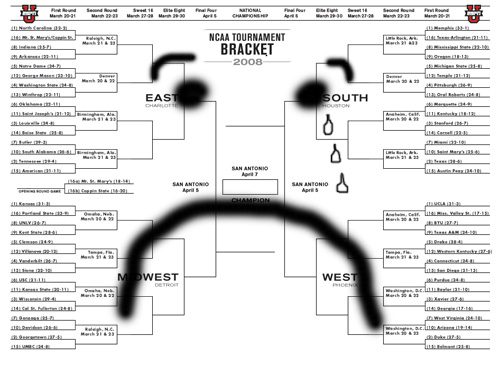 Some sources will tell you that the NCAA Tournament's expansion to 96 teams is as guaranteed as death and taxes. Others, including the NCAA itself, want to tell us to pump the brakes, nothing's set in stone yet.
Some sources will tell you that the NCAA Tournament's expansion to 96 teams is as guaranteed as death and taxes. Others, including the NCAA itself, want to tell us to pump the brakes, nothing's set in stone yet.And if you buy that, you're obviously shopping for some Arizona swampland.
I'm not here to cry fire and brimstone and claim that a 96-team tournament means that the apocalypse is nigh or the terrorists will win or whatever. What I am here to claim is that there is a fair, equitable way to do it without this basically becoming a care package for the BCS conferences.
The worst thing that can happen for the tournament is some 16-16 team from the ACC getting into the Big Dance ahead of, say, a 23-9 regular-season champion from the MAC who got poleaxed in the conference tournament.
If the regular season means something, then dominating your conference should mean something. Something more than making excuses like, "Oh, well, their record was terrible because they played dominant competition."
The one way the NCAA can make Greg Shaheen not sound like a total liar when he spouts off about "increased opportunities" in between bouts of ignoring John Feinstein's questions is in actually granting opportunities to those who truly need them: namely, the other 25 conferences (not including the Great West).
Offer automatic bids to the regular-season AND tournament champions of each conference, following the recommendation of that noted mid-major advocate Mike Krzyzewski, and the whole thing becomes much more palatable. Expand the tournament just so the Big East and ACC can challenge themselves to see if EVERY member can reach the Big Dance, and what are we left with?
Well, we're left with college football, in all honesty: a Mafioso system with 20 percent of the leagues drawing 70 percent of the party invitations.
Offering two bids for each non-BCS league gives us 50 spots filled, allowing 46 more for the BCS leagues and other assorted at-larges (which, let's face it, will be the endangered species in the Fat Bracket arrangement). Even if there are no other mid-major at-larges, the Cartel will still be fighting over seven bids per conference, or 14 more than they managed this season.
Also consider: only 41 of the 73 BCS schools managed winning records this season. Dan Guerrero, or whoever takes over the committee chair, will tie themselves in knots trying to defend the inclusion of a 15-17 Pac-10 team over a 22-6 team from the Big Sky.
Or, perhaps, the NCAA will continue with its current method of "we'll tell you what you want and you'll like it."
======================================================================
Funny enough, the people who are all about more NCAA spots are the power-conference coaches, who all like the idea of being rewarded for landing between the 20th and 30th percentiles, the schools who get left out now.
What does this do to alumni, administration, and trustee expectations, however? If a coach gets a three-year leash to reach the 20th percentile, does he get the same latitude to get into the 30th? If tournament places are given out like candy, is the window reduced to two years to reach one?
Coaches like the idea of an easier coat of resume polish, but diluting the pool cuts both ways. If a goal is easier to reach, but still not reached, a lot of coaches will find themselves with even less time to do so, losing their job security in the quest to gain more job security.
Not sure if that's irony, but it's gotta be close.
======================================================================
Finally, there's the argument that there will be no more "Cinderellas," depriving the tournament of its charm and drama.
What, like there are so many now?
Dick Weiss of the New York Daily News, linked above, couldn't even give any coherent reasons why the upsets would never happen. If Ohio University, for example, could beat Georgetown, why in the world could they not beat North Carolina (to continue beating this dead horse)? And did anyone honestly think that the Bobcats were launching a run to the Final Four after beating the Hoyas, anyway?
Not many outside of Athens, Ohio, I'm sure.
Butler qualified as a "Cinderella story," despite the fact that they ended the regular season ranked eighth in the nation. New Mexico was a three seed, ranked in the top 10, but would have also stunned everyone if they'd gotten to Indy. Why? Simply because the four semifinalists are only supposed to come from the same six leagues that can win the football championship, too. Outsiders are treated as interlopers and curiosities, sort of like a five-legged unicorn.
Let's not OVER-romanticize the tournament. The Bryce Drews and the Courtney Lees and the Mouse McFaddens and the Steve Nashes are great stories...for the first weekend.
The second weekend is all about the hoops factories. So it has always been, so it shall (probably) always be. Butler's path this season would have been no different in a 96-team bracket than it was in a 65.
The Tournament is still The Tournament. It's still a vastly superior system to the BCS football cartel. Most of us will adapt and survive, even Betty the receptionist, who'll have to pull out her reading glasses to read the smaller team names on the bracket sheet...most of which she knows nothing about anyway, but that still won't stop her from taking all of your money in the office pool.




No comments:
Post a Comment